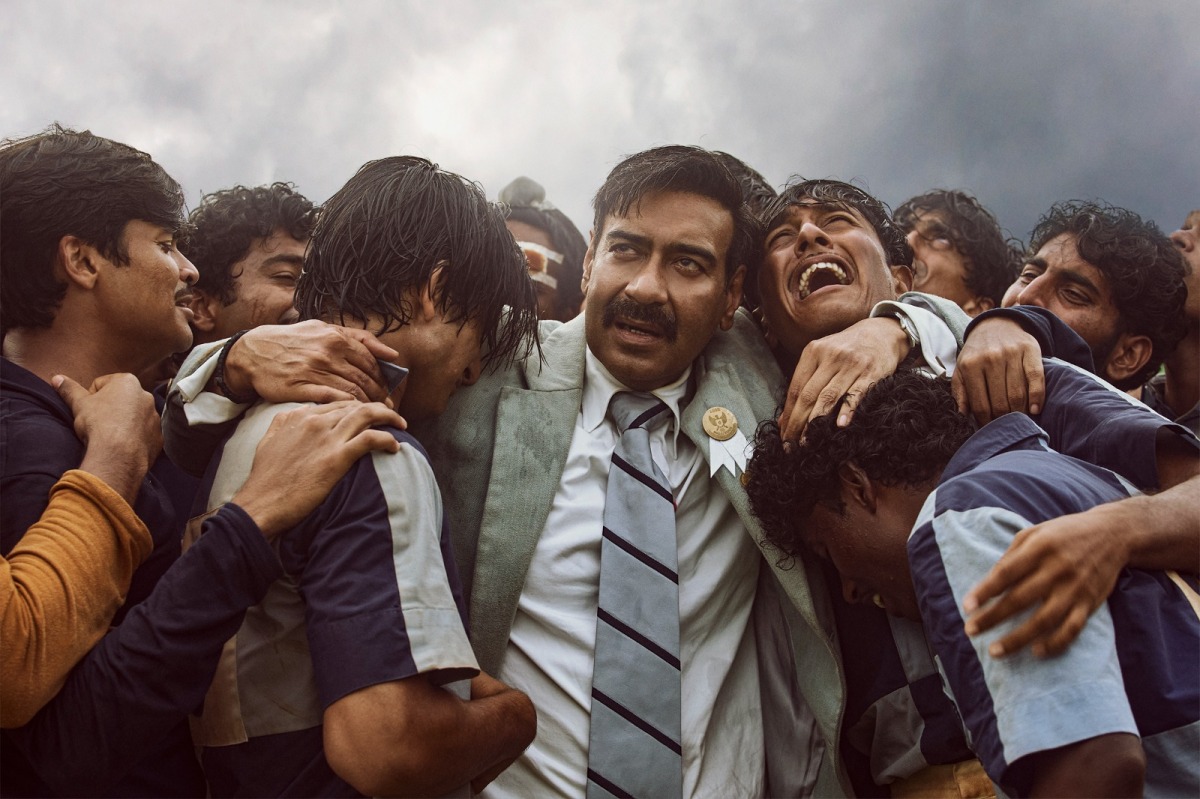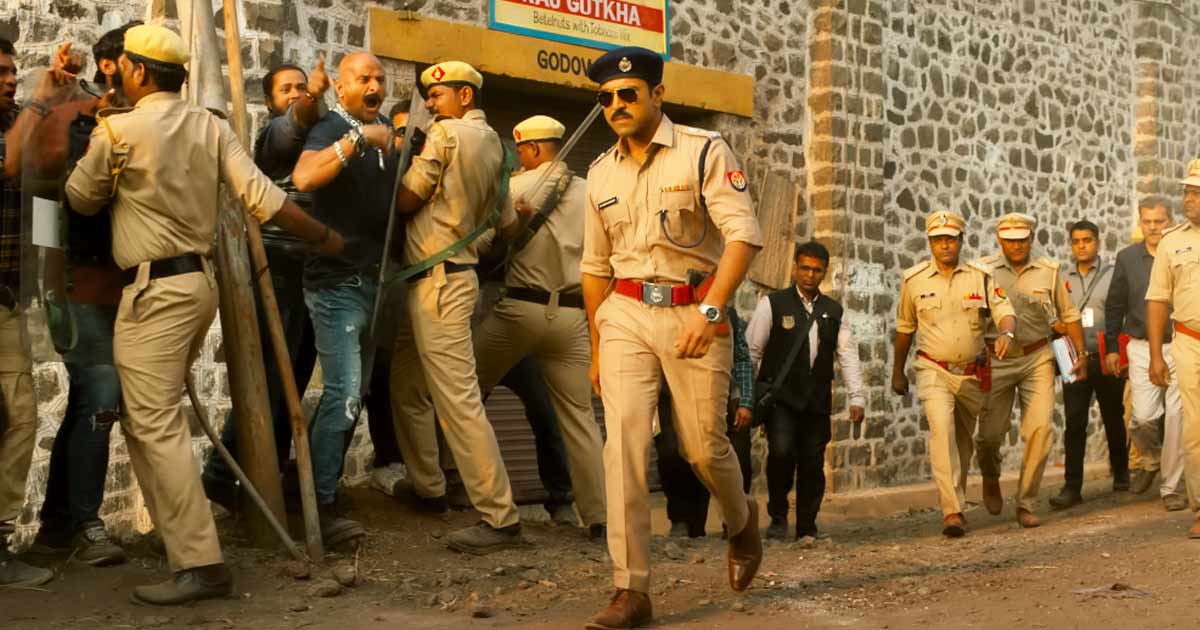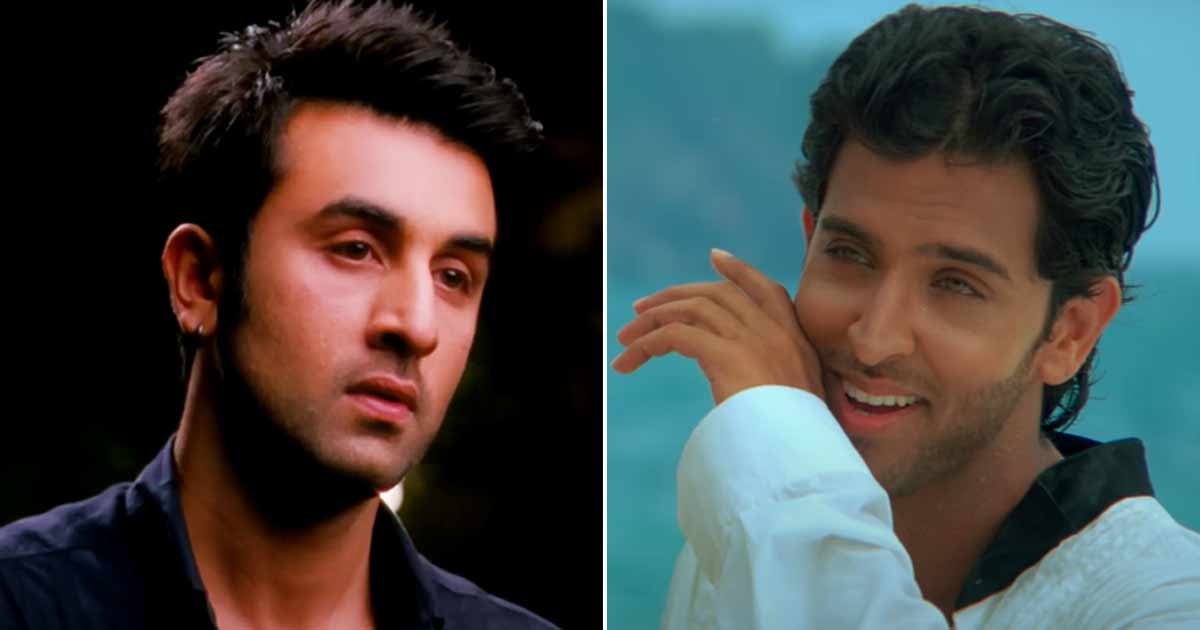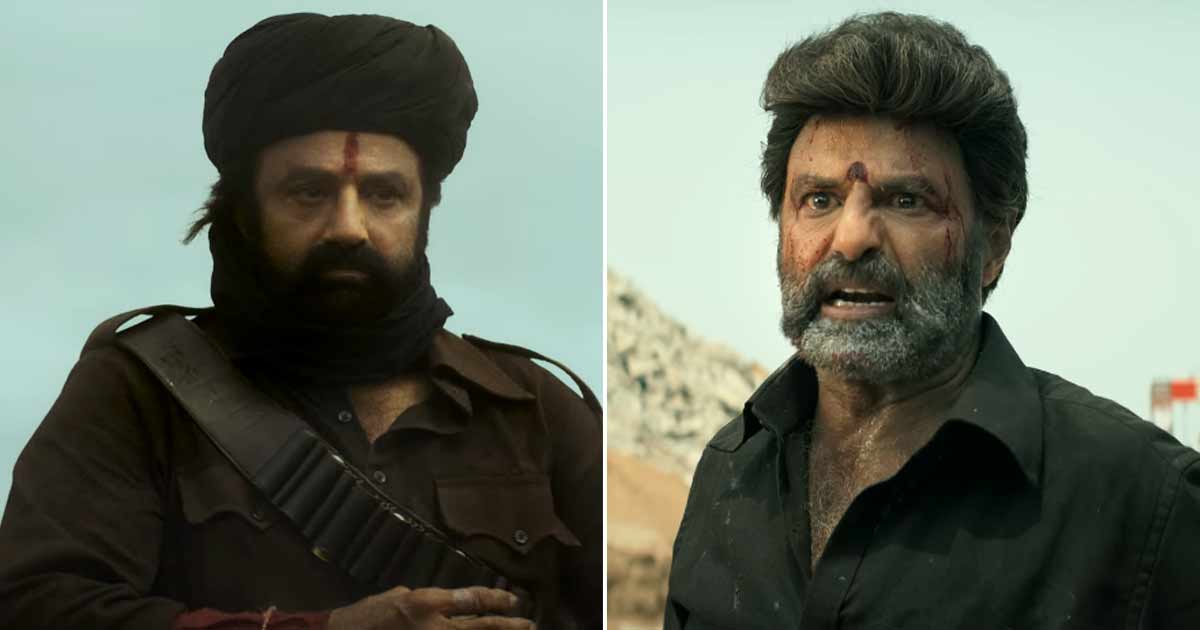
Ajay Devgn finds his feet in the maidaan of Syed Abdul Rahim – Beyond Bollywood
Director Amit Ravindernath Sharma’s film on India’s most revered football coach is inspiring. A certain Bengali bias, though, will raise brows in West Bengal.
Rating: ⭐️⭐️⭐️ (3 / 5)
By Mayur Lookhar
In a country passionate about cricket, many may not realize that the gentleman’s game once lagged behind hockey and football. Indian hockey enjoyed a glorious past, dominating for decades before its decline in the 1980s. While Indian hockey has somewhat recovered from its prolonged drought phase (1981-2010), Indian football remains stagnant, with recent results indicating a further decline.
Despite the worrying state of Indian football, the game’s popularity in India remains unaffected. As a child of the 1980s, this reviewer remembers seeing fellow Indians donning Brazil and Argentina jerseys during a FIFA World Cup. Desi football fans are more enamored with global football leagues. Many, like this reviewer, have pledged allegiance to European football clubs like Arsenal, Liverpool, Manchester United, Barcelona, Real Madrid, and Bayern Munich.
Given this scenario, how can we expect this generation of fans to recall or even know about the Golden Era of Indian Football? It was during the 1950s and early 1960s when Indian football flourished under the guidance of the maverick coach Syed Abdul Rahim. His achievements are etched in history, though lead actor Ajay Devgn’s admission of being unaware of this era prior to Maidaan [2024] underscores how far we’ve distanced ourselves from our football heritage.
It’s easy to criticize the average Indian, but for any sport to thrive, positive results are crucial. However, such successes have been few and far between for Indian football. In fact, India hasn’t won a global tournament since the 1962 Asian Games. Additionally, Indian football has garnered more attention for its bureaucratic issues, with vested interests turning the All-India Football Federation into their fiefdom.
Reflecting on the Golden Era, which produced legends like P.K. Banerjee, Chuni Goswami, Jarnail Singh, Peter Thangaraj, and Tulsidas Balaram, AIFF surely must have been a highly professional, transparent body then. Or was it?
Maidaan serves as a reminder of this golden era but also highlights why Indian football has often been hindered by poor administration. While the controversial eras of Priya Ranjan Dasmunsi and his successor Praful Patel may be over, Indian football still lags behind on the global front. In such times, it becomes even more crucial to remember and honor the golden era of Indian football.

Director Amit Ravindernath Sharma, along with principal writer Saiwyn Quadras, covers both on-field and off-field action in Maidaan [2024]. The story is rightly narrated through the lens of coach Syed Abdul Rahim [Ajay Devgn]. In a team sport like football, no individual is greater than the team, and the choice of the film’s title, Maidaan, reflects this ethos.
Bollywood sports biographical films haven’t been warmly received in the recent years. but Maidaan is likeable for its realistic and humble approach in telling this inspiring story. Ritesh Shah ensures simplicity in the dialogues.
It’s not a comparison, but Chak De! India [2007], that was inspired by Indian eves’ triumph in field hockey at Commonwealth Games 2002, was every bit a team work. Super star Shah Rukh Khan played Kabir Khan, the inspiring coach. Like any good coach, Khan was happy to let the women take centerstage. In contrast, Ajay Devgn stands like a colossus figure in the Maidaan screenplay. This may not be ideal for a compelling sports biographical film, but what makes Maidaan appreciable is the Syed Abdul Rahim personal story, and the grave circumstances under which he achieved the impossible. Besides, unlike Chak De! India, where Mir Ranjan Negi was turned into Kabir Khan, Maidaan sticks to the original hero – Syed Abdul Rahim.

Devgn’s portrayal of Rahim saab [as the great man was fondly called] is marked by a calm demeanor, offering a positive depiction of a forgotten hero from the minority community. This departure from the divisive themes often seen in Bollywood films is refreshing.
He believed in total football, encouraging all his players to express themselves. Unlike the charismatic, General-like modern football coaches (Mikel Arteta, Jurgen Klopp, Diego Simeone, Thomas Tuchel), Syed Abdul Rahim, though a tough taskmaster, was a man of few words. He wouldn’t throw a fit if his side is 0-2 down. Rahim’s coaching philosophy of total football, coupled with his personal struggles, adds depth to the narrative. Devgn’s performance effectively captures Rahim’s intensity and conviction.
On the personal front, Rahim’s relationships with his family members, particularly his wife Saira [Priyamani] and footballer son Hakim, add emotional layers to the story. He’s there for his family, but just doesn’t have enough words for them. Priyamani is mighty impressive as Rahim’s wife Saira. Rahim’s equation with his footballer son Hakim is intriguing too.

Another thing that made Devgn the apt choice is Rahim’s penchant for smoking. It’s a habit that’s translated onto the screen too for Devgn. Phew, we feared whether the ‘smoking is injurious to health’ disclaimer would flash consistently on the screen. As the story progresses, there’s a price to pay. We’re sure back home, Devgn’s kids and actor wife Kajol would hope that he curbs this habit.
The screenplay is so heavily dependent on Syed Abdul Rahim that jeez, great players like P.K. Banerjee, Chuni Goswami, Neville D’Souza are largely reduced to their on-field pyro techniques. Chaitanya Sharma, Amartya Ray, Davinder Singh, Aryann Bhowmik might not be familiar names, but the end credits photos reveal why they were apt choice to play P.K. Banerjee, Chuni Goswami, Jarnail Singh, and Neville D’Souza, respectively.
Over the years, sports biographical films in Bollywood have acquired a certain template. The antagonist in these stories is often a bureaucrat, an envious coach, or a critic. More than an antagonist, these characters reflect the pessimistic approach of an arm chair critic.

The AIFF board is led by one, but the biggest obstacle to Syed Abdul Rahim is top sports journalist Roy Choudhry [Gajraj Rao]. In their first meet, Rahim rubs him the wrong way, which then leads to Choudhry running a smear campaign against the former.
Alright, journalists were once feared, but Amit Ravindernath Sharma has perhaps empowered Roy Chowdhry a bit too much for our liking. Can a sports journalist be close to the pitch during a global tournament? Rao finely exhibits that envious attitude well, but we’re still not convinced by this media personnel’s pull in Indian football.
The one pessimist that is likely to raise brows in West Bengal is Sharma’s AIFF president Shubhankar [Rudranil Ghosh}. Is this character and his envy story pure fiction? Kins of former presidents Pankaj Gupta (1950-1960], Manindra Nath Datta Ray [ 1960-1975] may not be amused by the representation. Shubhankar and Roy Chowdhry’s Bengali bias too will be questioned in a state that has a strong football legacy. Ghosh is flawless in his act, particularly impressing in the envious scenes, frustrating not just Rahim, but also the viewers with his wicked smile.
It’s interesting to look into Ghosh’s political background. He was a student leader of the Left Front (CPI), then joined Mamata Banerjee’s Trinamool Congress, before defecting to Bharatiya Janata Party in 2021. The Bengal bias and Ghosh’s presence in the film is likely to be discussed in Kolkata’s Park Street, College Street, and Jadavpur University.
The most eye catching one will have to be the hostile reception that the Indian contingent received from the Indonesians at the 1962 Asian Games. Blame that on a loose talk by a diplomat who was part of the travelling Indian contingent. Jeez, Indian government /sports officials travelling by the dozens has been such a malaise for eternity. A little dig into history would reveal that the controversial comments perhaps came from the highest office which then led to temporary strained diplomatic relations.
Honestly, before the screening, we were humble in our expectation. We left being inspired by the incredible story, and Syed Abdul Rahim’s yeomen service for Indian football. The intense football action is captured finely with the camera pointing to the feet of the players. We presume that might be the unsung football players. The mid shot though revealed the face of the actors, who naturally have to move as per the demand of the director, cinematographer. Drama is weaved in football matches, particularly the final of the 1962 Asian Games. Who doesn’t like last minute goal or incredible saves? A blood-spitting coach though is not a pleasant sight.
Maidaan stands out for its immersive production design, giving the viewers a semblance of the 50-60s.
Winning and losing is part of the game, but sportsmanship should never be ignored. Sharma perhaps went overboard in painting a negative portrayal of some of the opponents. The Aussies can be bullies, but the representation of few players from Thailand, South Korean is bizarre. The French, though, are shown as classy. Among the crowd, the Italians, too, cheered the fighting spirit of India at the Rome 1960 Summer Olympics. One, however, is surprised to hear the words ‘come on’ from local Italians, as well as travelling French fans.
There’s never any perfect team or a perfect film. Amit Ravindernath Sharma’s Maidaan has its rocky patches, but as its desi commentators [brilliantly played by Vijay Maurya and Abhilash Thapliyal], say, ‘is game mein haath nahi, yeh apni kismet pairo se likhte hai’ (In football, it’s not hand, but you write your destiny by feet). Of course, a certain Diego Maradona and his ‘Hand of God’ is a celebrated exception.
Maidaan is set to be released in theatres globally on 10 April ,vand 11 April in India.
Watch the video review below.
Publisher: Source link



